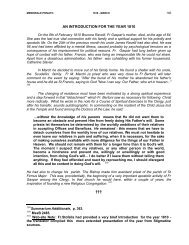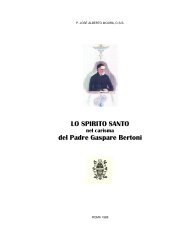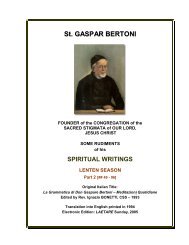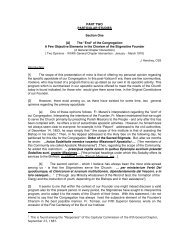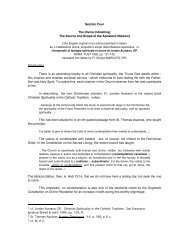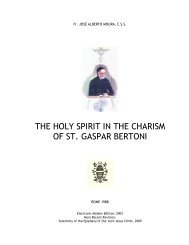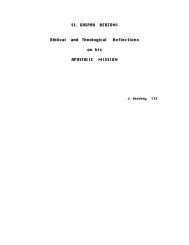Part 3 - St. Gaspar Bertoni
Part 3 - St. Gaspar Bertoni
Part 3 - St. Gaspar Bertoni
You also want an ePaper? Increase the reach of your titles
YUMPU automatically turns print PDFs into web optimized ePapers that Google loves.
Naudet-Accordini= 1 =CONCLUSIONAt the end of this work, it seems that it can be stated that Mother Naudet’spersonality flows forth from her writings, that are stamped with her individual traitsthat are quite pronounced. It is noted how in her spiritual formation, a number ofschools influenced her make-up: the Ignatian, the Carmelite and the Salesian. From anattentive reading of he Spiritual Journal, however, there comes to the fore also thefact that Mother Leopoldina did not follow passively these spiritual orientations, butshe vivified them, and made them her own. The “divine service” and the IgnatianExercises, prayer, obedience and the interior peace of the reformer of Carmel, her“simplicity” and “charity” of <strong>St</strong>. Francis de Sales are motives that interweave and fusein Mother Naudet’s religious experience. Her spiritual life s furthermore illumined bythe virtue of hope, in its two-fold aspect of confidence and abandonment, by humility asa genuine knowledge of oneself, and by obedience, as that means of conformity to theWill of God.The worship of the Eucharist and the devotion to the Holy Family translateconcretely Mother Leopoldina’s intense piety. It is here that there is discovered hersoul, and in which there is summarized her entire spiritual experience. Her Eucharisticcontemplativeprayer seems to constitute for Mother Naudet the very heart of herinterior life, the attraction of her spirit and that act that gives tonality to her entirespiritual undertaking.Her devotion to the Holy Family , chosen as the model of both thecontemplative and active life, for herself and for her Institute, opened Leopoldina up tothe “ecclesial sense”, so characteristic of the spirituality of the period and inserted herinto the religious movement in which there was made ever more evident the relationshipbetween the spiritual life and a social commitment. The most salient fact of this womanis, however, that of not ever feeling obliged to one spiritual method over another, but inallowing herself to be guided interiorally by a piety of listening to the divine voce.After God had made Himself known in some experiential manner, from her childhood,she sought and experienced Him in an ineffable manner in mystical union, constitutedfor Mother Naudet, the sole goal, to Whom she directed her most profound desires.Her exterior activity, indeed valued and esteemed as the means of procuring the “greaterglory of God”, never succeeded in obscuring the primacy of contemplation.Rather, it is proper to her contemplation which, according to Mother Naudet,flowed from the “fruitful union” of her apostolic work in the bosom of the Church. Itseemed therefore that one could approach the person of Mother Naudet in that “verynumerous company of women of exquisite spirituality and apostolic ardor who enrichedthe Church of the 19th century of religious institutions and families.What truly strikes one is that there is hardly a single one of these newfoundations which did not propose for itself, at least in part, the exercise of the activeapostolate. This vocation can be discovered above all in looking at the personal livesof these foundresses. The case is not rare of one who would believe she was beingcalled to contemplation, and that also at the price of renunciation, she directed insteadher own charity toward the effective assistance of the sick, toward orphans, to young
Naudet-Accordini= 2 =women in danger and to their instruction and religious education 1 . Mother LeopoldinaNaudet, too, gave up her much dreamed of cloister in order to found an institution ofmixed life, in which contemplation found its exterior projection in the work ofeducation in behalf of the youth..The EndA. APPENDIX[a] There is presented here Mother Naudet’s Library, subdivided into thesesections: Spiritual Works; Books of Devotion; Other works, and then texts withoutauthors[b] The authors, or texts that bear the little cross [+] were those works for theprivate use of Mother Naudet and which bear within them some hand-written jotting ofthe Foundress.1. Her LibraryALETOFILO, Pacifico Trattati della confidenza critiana, Venezia 1751.ANGELICO DAL PORTO DI FERMO, Gesu’ Cristo modello di una religiosa, Fermo1793 Roma 1796.AUGUSTINE, <strong>St</strong>. Le divote meditazioni, Venezia 1594, 1753.Meditazioni, soliloqui e manuale, Modena 1713.Le confessioni, Venezia 1746, 1752; Bassano 1803.Delle confessioni, a cura di P. Gagliardi, Venezia 1762.Le veglie, a cura di Giulio G.D. , Venezia 1806 - Bassano 1816.Serroni, Milano 1820.AURIEMMA, T., <strong>St</strong>anza dell;anima nelle piaghe di Gesu’, Venezia 1691, 1732,1755 [Only the lst part].BADIA C. F., Panegirici e ragionamenti ed orazioni diverse, Venezia 1750.BAGNATI, S. Apparato eucaristico. Venezia 1792 [2º].BAMBACARI, C.N., Meditazioni, divisae per le tre vie, purgativa, illuminativa, edunitiva. Venezia 1740, 1745.BARBUGLI, D., Lezioni spirituali ad uso delle monache, Bassano 1766, 1788.BARCELLONA, A. Le felicita’ dei santi. Palermo 1800 [in three volumes].BARTOLOMEO DELLA CITTA’ DI CASTELLO, Dialogo dell’unione sprituale diDio con l’anima. Venezia 1693.BASSANIN, F.La religiosa in tre stati di novizia, di professa, e di conversa.Venezia 1731, 1739.BAUDRAND,L’ame intrieure ou conduite spirituelle dans les voies de Dieu.Paris 1829.BERNARD, <strong>St</strong>. Lettere,. Roma 1736.Volgarizzamento del trattato della coscienza. Verona 1828.1A. Prandi, ~”Correnti e figure della spiritualita’ cattolica nei sec. XIX e XX”, in: LaChiesa Cattolica nella storia dell’umanita’..., V, p. 119.
Naudet-Accordini= 3 =BIOGIOCERO, D. La Madre del Bell’amore. Roma 1778.BOLDU’, G. Considerazioni sopra la Cantica esposte alle sacre vergini.Venezia 1734.La monaca nel deserto con Cristo. Vnezia 1775.BONNUCI,A.M. S. Gertrrde vergine la Magna, Venezia 1743.+ BORROMEO, <strong>St</strong>. C. Sermoni familiari fatti alle monache delle Angeliche.Padova 1720.BOSSUET, J.B., Lettere spirituali. Venezia 1797.BOTTI, P. L’HORE della monaca ben spese e documenti a cio’ necessari.Venezia 1711.BONHURS, Parole tratte dalle sante scritture e parafrasi dei salmipenitenziali. Milano 1820.BOURDALUE, L. Sermones pour le caresme. Lion 1708 [2º] - [only Vol. II] .Ritiramento spirituale ad uso delle comunita’ religiose. Venice1742, 1753, 1774 - Parma 1757.Pensieri sopra diversi punti di religione e morale. Venezia 1800.Prediche recitate i due evventi. Venezia 1800.Sermoni per le domeniche dell’ann. Venezia 1801.Sermoni sopra i misteri. Venezia 1802.Prediche quaresimali. Venezia 1802.Esortazioni ed istruzioni cristane. Venezia 1802.Panegirici e sermoni. Venezia 1805.BRUNO, V. Meditazioni sopra i principali misteri della vita della beataVergine.Venezia 1803.CAMUS, P. Lo spirito di s. Francsco di Sales. Venezia 1735, 1777.CATERINA da SIENA, <strong>St</strong>. Lettere, Venezia 1562, 1583.CATTANEO, C., Opera. Venezia 1719. [in three volumes]Massime eterne proposte in varie lezioni. Venezia 1725.CAUSINO, N.Pratica della vita dvota. Brescia 1735.CAVIARI, A. Ritiramento spirituale. Venezia 1814 [3º].CHAMPION de PONTALIER, Pensieri critiani. Milano 1814 [3º].CHIAVACCI, V.,Ragionamento sopra un saggio della grandezza di Dio. Verona1828.CORNARO, M. Sermoni alle monache. 1773.CROISET, G. Esercizi di pieta’. Venezia 1725. [2 collections], 1794, 1797,1826.Ritiramento spirituale. Venezia 1728, 1784, 1792.DA LAGNI’, P. Introduzione alla vita attiva e contemplativa. Veronaa 1743.DA PONTE, L. Meditazioni, Brescia 1520; Bologna 1726, 1760; Milano 1729,1739; Venezia 1749; Napoli 1758.Vita spirituale. Venezia 1744.DE BARRY, P. Trattenimenti di figlagia, ovvero pratica dellae virtu’. Venice1671, 1729.Solitudine di filagia. Venezia 1673, 1678, 1735.DE LIGUORI, A., <strong>St</strong>.La vera sposa di Gesu’ Cristo, cioe’ la monaca santa. Venezia1741, 1761 [2º], Bassano 1781 [5º]. 1791 [6º],1819 [6º]. 1829 [7º]
Naudet-Accordini= 4 =Via dlla salute, meditazioni e pratiche sprituali per acquistare lavita eterna. Bassano 1793.Opere spirituali. Bassano 1807 [13º], 1811 [14º].Riflessioni sulla passione di Gesu’ Cristo. Bassano 1820.Discorsi sacri morali, ossia sermoni. Bassano 1820.Pratica di amar Gesu’ Cristo. Bassano 1826 - Venezia 1828.Apparecchio alla morte. Milano 1827 [5º].Meditazioni per otto giorni d’esercizi spirituali. Verona 1828.DE L COLOMBIERE, C. <strong>St</strong>., Lettere spirituali. Venezia 1719.DE LOMBEZ, A. Trattato della pace interiore. Venezia 1782.DELL’OVIVADI, A. Meditazioni sopra la dolorosa via. Bassano 1819 [only Vol. I].DIOTALLEVI, A. Trattenimenti spirituali per chi desidera d’avanzarsi nella virtu’e ell’amore della Ss. Vergine. Venezia 1805, 1806.DOMENICO di S. TERESA, Esempi e documenti della gloriosissima santa madreTeresa. Brescia 1742.DOUCIN, L., Massime e frutti di eterna salute . Milano 1822.FACCHI, G. Dialogo sacro sopra gli aatti degli Apostoli. Venezia 1734.FADINELLI, B. Sermoni alle monache. Vicenza 1773.FONTANA, A. La religiosa santamente occupata verso Dio, verso i prissimi,verso me stessa. Venezia 1714 [3º].La religiosa santamente occupata nel ritiro degli esercizispirituali. Venezia 1741.FORESTI, A. Il sentiero della sapienza. Venezia 1710.FRANCIS de SALES, <strong>St</strong>. Opere. Venezia 1698, 1723, 1735, 1773.Lettre. Venezia 1662, 1777, 1804; Padova 1729.Massime dottrinali fedelmente raccolte dalle opere di S.Francescodi Sales da un canonico della cttedrale di Verona.Bassano 1768.FREMIOT, G. F. di CHANTAL, <strong>St</strong>. Il direttore delle religiose. [extract from hereworks] Brescia - Bassano 1673; Venezia 1763-1785.+Opere. Venezia 1770.GAETANO MARIA DA BERGAMO, L’umilta’ del cuore. Bresxia 1739; 1748 [7º];1812 [12º].Due pratiche di umilta’ che sono di non giudicare gli altri eattendere a giudicare noi stessi. Brescia 1750.La fraterna carita’ ideata in riflessioni sacre e morali con unesamepratico sopra l’istessa virtu ed un alatro spra i viziopposti. Padova 1757.Pensieri ed affeetti sopra la passione di Gesu’ Cristo. Venezia1795, 1825; Milano 1821.GAGLIARDI, A. Breve compendio della perfezione cristiana. Verona 1757.GALLITIA, P.G. La vita di S. Francesco di Sales. Venezia 1712.GIOVANNI DELLA CROCE, <strong>St</strong>. Opere spirituaali. Venezia 1682.Trattato delle spine dello spirito. Venezia 1750.GIOVANNI D’AVILA Lettere spirituali. Brescia 1728 [6º].GIROLAMO,<strong>St</strong>. L’Epistole. under the care of P. Canisio. Venezia 1749.GIUSTINIANI, P. [B.] Trattato dell’ubbedienza. Padova 1753.
Naudet-Accordini= 5 =GOZZI, G. L’anno cristiano contenente le Epistole e i Vangeli. Venezia1761 [in 13 volumes].GRANATA, L. Opere. Venezia 1753.GRASSET, G.La manna del deserto per le persone in ritiramento. Venezia 1716.1793.Considerazioni cristiane per tutti i giorni dell’anno. Venezia1751, 1795.GRAZIANO, B. Meditazioni sopra la santissima comunione. I Venezia 1750.GRIFFINI, A. Lezioni morali sopra le quatatro virtu’ cardinali. Bologna 1793.GUEUARA, A. De i religiosi et esercitio de i virtuosi. Venezia 1757.INCONTRI, F. G. Spiegazione teologica liturgica e morale sopra la celebrazionedelle feste. Verona 1768.KEMPIS, Thomas a; Dell’imitazione di Cristo. Venezia 1756; Veronae 1798.LOYOLA, IGNAZIO,<strong>St</strong> Esercizi spirituali. a cura di P. Pinamonti. PAdova 1703.Regole della Compagnia di Gesu’. Roma 1716.Esercizi Spirituali. a cura di C.A. Cattaneo. Venezia1803.LANGUET, G. Trattato della confidenza nella misericordia di Dio. Venezia1721, 1806. [two copies].LEONARDO DA PORO MAURIZIO, <strong>St</strong>. Manuale sacro ovvero raccolta di varidocumenti spirituali per le monache. Venezia1757.La via del Paradiso, considerazioni purgative e illuminativesopra lemassime eterne e sopra i sacri misteri dellaPsssione del Signore. Verona 1820.LEONE, E. I treni del profeta Geremia. Milano 1818.LUCCHESE, M. I frutti della grazia divina. Verona 1754.MANCO, B. Il religioso santo. Venezia 1718 [2º].MARCHISIO, M. Parafrassi di sette salmi penitenziali. Torino 1745.MARIA CROCIFISSA DELLA CONCEZIONE. Scelta di lettere spirituali. Verona1727.MARTINI, A. Del vecchio e del nuovo testamento. Venezia 1785-1786 [37volumes].MASSILLON, L. Prediche sopra i principali misteri di Gesu’ Cristo della SS.Vergine e in lode di alcuni santi. Venezia 1790[twocopies].Quaresimale. Venezia 1803.Prediche. Venezia 1803.MEDICI, P. Dialoghi sacri sopra la civina scrittura. Venezia 1731-1738 [40volumes].MORCELLINI, A. Opusculi ascetici. Brescia 1820.MUSOCO,G. La lumiera del mondo Gesu’ Cristo nella sua passione. Trento1729.NAZIANZENO, GREGORIO, <strong>St</strong>. Due orazioni volgarizzate. Verona 1735.NEPUEU, F. Dell’amore di Gesu’ e dei mezzi per acquistarlo. Reggio 1821.
Naudet-Accordini= 6 =Pensieri ovvero riflessioni per tutti i giorni dell’anno. Venezia 1742.NIERIMBERH, G. E. Del prezzo e stima che si deve fare della divina grazia. Vernezia1672, 1673.Prodigio del divino amore. Venezia 1708.Vita divina. Vnezia 1722, 1761.PACIUCHELLI Trattato della pazienza. Venezia 1667.PEY Il saggio della solitudine. Verona 1828.PERGMAJER, G. Considerazioni sulle verita’ eterne. Roma 1820 [2º].PERSONIO, R. Guida deli uomini sulle verita’ eterna salute. Parla 1821.PINAMONTI, G. P. Opere. Venezia 1725.La religiosa in solitudine. Venezia 1730- Parma 1805.PINELLI, L. Gersone della perfezione religiosaa e dell’obbligo che ciasunreligioso ha d’acquistarla. Venezia 1623, 1675,1703, 1747.RAVAUMONT Riflessioni morali sopra l’historia del vecchio e nuovotestamento. Venezia 1814.RODRIGUEZ, A. Esercizio di perfezione e di virtu’ cristiane. Bassano 1747,1803; Venezia 1790; Milano 1833.ROISSARD La consolazione del cristiano e motivi della confidenza in Dio.Milano 1823 [3º].ROMUALDO M. da BERGAMO La croce del critiano. Roma 1721.ROSIGNOLI, C. G. Le lezioni dello stato rligioso. Vnezia 1673.Verita’ eterne esposte inlezioni ordinate principalmente per igiornidegli esercizi spiritali. Bassano 1744.La saggia elezione, Roma 1828.RUDONI, P. Gesu’ Cristo nei due testamenti. Lodi. Milano 1827.SANGIURE’, G.B. Orario della vita cristiana e religiosa. Venezia 1721.SCARAMELLI, G. B Dirretorio e ascetico. Venezia 1762, 1793.Direttorio mistico. Venezia 1788.SCUPOLI, L. Il combattimento spirituale. Venezia 1741.SEGNERI, P. Esercizi spirituali. exposed by L.A. Muratori. Venezia 1723-1784.La manna dell’anima. Venezia 1728 - Udine 1823.Panegirici sacri. Venezia 1757.SINISCALCHI, L. Quaresimale. Venezia 1760 [4º].SPINOLA, F.A. Meditaxioni sopra la vita di Gesu’ Signor nostro. Venezia1697,1711, 1746, 1795.STELLA, D. Meditazioni evotissime sopra l’amor di Dio. Milano 1828.STOLBERG, F. L. Vita e dottrina di Gesu’ Cristo. Milano 1828.TERESA di GESU’, <strong>St</strong>. Opere. Venezia 1712, 1714, 1789.TOMMASO d’AQUINO, <strong>St</strong>. Meditazioni cavate dall’angelica dottrina di S. Tommaso.Under the care of A. Massoulie’. Venezia 1711,1722, 1740.
Naudet-Accordini= 7 =TRENTO, G. Prechiche quaresimali. Venezia 1798 [3º].VANALELSCHI, S. Panegirici. Venezia 1746.ZEVIANI, M. Il snso del divino dei salmi. Verona 1784 [ 2 copies].ZILOTTO, G. M. Torchio crulccioso di passione. Venezia 1673.ZUCCONI, F. Lezine della scienza dei sant. Venezia 1742.Lezioni sacre. Venezia 1791.*****
Naudet-Accordini= 8 =2. Anonymous Spiritual WorksDell’amore di Gesu’ Cristo, meditazioni proposte da un sacerdote, D.C.D.M. Piacenza1790.Diario spirituale, che comprende una scelta di detti e di fatti di santi e di alatrepersone disingolare virtu’. Venezia 1789 [2º]; 1823 [8º] [two copies]; Venice 1831 [7º][two copies].Epistole ed evangeli secondo l’uso della S.R. Chiesa e l’ordine del Messale Romano,tradodtti inlingua toscana da Remigio Fiornetino. Venezia 1800, 1816.Historia del Testamento vecchio e nuovo. in tre tomi. Venezia 1708.I consigli della sapienza. Venezia 1753.Il Vangelo secondo la concordanza dei quaattro evangelisti, esposto in meditazionedistribuito per tutti i giorni dell’anno indodici tomi, da un sacerdote torinese.Firenze 1790;Milano 1814.L’anima desolata. Venezia 1781, 1820 [4 copie], 1824.L’anima in traccia del suo ultimo fine con la scorta della fede. Venezia 1724.Massime tratte dalle opere di S. Francesco di Sales e di altri maestri di spirito.Bassano1832.Mistica citta’ di Dio. Trento 1712, 1721, 1723.Motivi di amare Dio spiegati in meditazioni estratte dalle opere di alcuni auatori dellaCompagnia di Gesu’. Venezia 1742.Parafrasi dei salmi di David [no place or date are given for the publication].Pratiche delle virtu’ teologali. Modena 1771.Pratiche per mantenersi alla presenza di Dio, di un eccleiastico francese. Venezia 1721 [3º].Sentimenti cristiani adattati alle persone malaaticcie ed inferme, estratti dal S. Scritturae da’ Santi Padri. Milano 1824.<strong>St</strong>oria del Testamento nuovo con spiegazioni estratte da’ Santi Padri. Venezia 1802[ony the IInd Volume].Trattatello sopra le piccole sofferenze. Padova 1798.*****
Naudet-Accordini= 9 =3. Works of DevotionCAARLO di PORZIA, Della divozione al sacro cuore d Gesu’ secondo lo spirito dellaChiesa. Bassano 1803.DeLIGUORI, <strong>St</strong>.A. Novena del Sanato Natale. Bassano 1746, 1797, 1820.Traduzione dei salmi e dei cantici che si contengono nell’ufficiodivino del Beato Alfonso M. de Liguori. Bassano 1824.DUQUESNEdelleLe grandezze di maria esposte in meditazioni per ogni ottavasue feste. Fermo 1796.FERRERIO,V. La divozione impiegata nell’apparecchio dell’anima percelebrare confrutto le feste principali della santissima Verginee la nascita del suo unigenito figlio Gesu’. Venezia 1773,1756, 1761[4º] [9 volumes].GIUSTINA, B. Anno coronato dalla divotamemoria delle solennita’ di Nostro \Signore, della eccelsa Vergine e di alcuni santi. Venezia1795.MARCHESE, F. Pane quotidiano dell’anima, cioe’ diario d’esercizi divoti perciascun giorno, ad onore del venerabilissimoSacramento dell’Altare in four volumes, Venecie1721; 1735.MARCONI, G. Il mese di marzo consacrato al gloriosissimo patriarca S.Giuseppe.Piacenza 1827.NATALE, A.NAVARRA, G.[onlyIl paradio in terra. Padova.Esercizio divoto di otto giorni in onore di S. Ignazio. Palermo1700; Venezia 1799.Meditazioni sulle feste ancor novissime dei sanati del mese digennaio fino all’ultimo di luglio. Padova 1734.Vol. III].PATRIGNANI, A. La sanaa infanzia del figliolo di Dio. Venezia 1715.Il divoto di S.GIuseppe. Firenze 1803.Settimana eucaristica ovvero pratiche divote a onor del Ss.SINISCALCHI, L.Sacramento.Venezia 1742, 1760, 1778.L’amor dei Cuori Gesu’ BAmbino, novena di NAtale e ottava.Venezia 1743, 1754, 1790.Il cuor tra le fiamme dello Spirito Santo, ovvero esercizi divotiper la novena festa della Pentecoste. Venezia 1773 [4º];1819 [7º] [3 copies].
Naudet-Accordini= 10 =Il giorno santificato ovvero pratiche spirituali. Venezia 1821.VAUBERT, P.L. La divozione a Gsu’ Cristo nell’Eucarestia. Venezia 1721.*****
Naudet-Accordini= 11 =4. Anonymous Works of DevotionDelll’ amore di Gesu’ Cristo Dio. Piacenza 1789.Divoti affetti d’un’anima verso Dio. Bergamo 1801.Divotissimi esercizi in onore del Santissimo nome di Gesu’. Venezia 1809.Esercizi divoti da farsi per nove giorni dinanxi alla miracolosa immagine di Gesu’nazzareno. ordered by A. Cesari, Priest of Verona. Verona 1819.Eserciice de devotin au sacre Coeur de Jesus. Besancon 1809.I giorni di tutto l’anno santificti giusto lo spirito di S. Francesco di Sales, a cura di unprete dell’ Oratorio di Milano. Milano 1741.Il divoto del Santissimo Sacramento. Venezia 1809 [3º].Il mese di Gesu’ bambino ossia il mese di gennaio consacrato alla S. Infanzia di Gesu’Cristo. Venezia 1819.Il mese di maggio, o il mese dedicato a Maria. Veneza 1822.L’anima elevata a Dio. Venezia 1826.La devozione al Sacro Cuore di Gesu’. Verona 1804.La divozione al Sacro Cure di nostro Signore Gesu’ Cristo. Venezia 1737-Bassano1781.La divozione del Santissimo Cuore di nostroSignore Gesu’ Cristo. Venezia 1820 [3º][2 coies].La manna nascostra nell’esercizio dell’orazine mentale e nella pratica della virtu’indicataai fedeli per il mese di maggio consacrato alla gran madre di Dio without anyindicationof the place, or date of publication].Lo spirito e la pratica della divozione al sacro Cuore di Gesu’. Parma 1795.Novena o tlridui in onore di S. Giuseppe sposo di Maria santissima, con i salmi cheformano i SS. nomi di Gesu’, Maria e Giuseppe. Piacenza 1827.+ Officium recitandum in nocte Nativitatis Domini. Venezia 1795.+ Raccolta di vari offici ed orazioni prese da’ santi Padri ed altri autori. Roma 1801[two copies].Sacri ritiri nelle piaghe di Gesu’ nel seno di aria per l’anima che desidera avanzarsinellevirtu. 1716 [5º].+ Sommaire des constitutions de S. Ignace, manuel a’ l’usage des filles de la Societe’du Coeur de Marie. 1818.*****
Naudet-Accordini= 12 =4. <strong>St</strong>ill Other WorksADELL, T. Della vita della serva di Dio Marianna Russo. Napoli 1761.ALFONSO DI BEANCH <strong>St</strong>oria delle sciagure del S. P. Pio VII. Torino 1824.BACCi, P.G. Vita di S.Filippo Neri. Venezia 1794.BAGNATI, S. Vita del servo di Dio, P. Francesco Geronimo. Napoli 1725.BAGOTTA, B. Vita del ven. servo di Dio, Alberto Maria Ambiveri da Bergamo.Venezia 1583.BARTOLI, D. Della vita e dell’Istituto di S. Ignazio. Venezia 1735.Opere Torino 1825 [25 volumes]BERTOLINI, S.L’uomo al punto cioe’ di morte. Trento 1830.La rosa pervana ovvero vita della sposa di Cristo, suora Rosa diS. Maria. Roma 1699.BOLLANDO e Compagni, Vite scelte di 40 religiose benedettine. Venezia 1729.BONAVENTURA da COCCAGLIO, Vita, virtu’ e miracoli del beato Lorenzo daBrindisi... Venezia 1783.BOSSUET, J.B.Istruzioni alla filosofia, ovvero trattato della cognizione di Dio.Venezia 1897.Choix ds meilleurs morceaux. Besancon 1822.Discorso sulla storia universale dalprincipio del mondo fino all’impero di Milano 1824.BRESSANVIDO Istruzioni morali sopra la dottrina cristiana. Bassano 1827.BUSSIER, C. Della vita del conte Luigi di Sales, fratello di S. Francesco.Torino 1824.CACHUPIN, F. Vita di padre Luigi della Ponte. Venezia 1733.CAILLOT, A. Bellezze del cristianesimo. Verona 1828.CALINO, F. Catechismo ragionato ossia la dottrina della Chiesa. Venezia1737.Il giovenetto Giuseppe proposto ai giovenetti studiosi. Venezia1816.CAMPANA, P.T. <strong>St</strong>oria di S. Pietro martire di Verona. Milano 1741.CARACCIOLI, M. Vita del sommo pontefice Clemente XIV. Ganganelli. Milano1777.CASTIGLIONI, L. Viaggio negli <strong>St</strong>ati Uniti dell’America settentrionale fatto neglianni1 1785, 1786, 1787. Milano 1790.CAVALCA, D. Volgarizzamento delle vite de’santi padri. Milano 1830.CHATEAUBRIAND Descrizione di Gerusalemme e luoghi santi. Milano 1826.CEPARI, V. Vita di S.Luigi Gonzaga. Venezia 1798.CESARI, A. Le grazie,dialogo. Verona 1813.Geremia. Milano 1815.Giuseppe. Milano 1815.Il Mose’ e Giosue’. Milano 1815.Lezioni storico-morali. Milano 1815.Vita di Teresa Saodata da Salo’ Roma 1816.Daniele e SS. donne. Milano 1816.<strong>St</strong>oria dei Maccabei. Milano 1816.Abramo e Tobia. Milano 1817.La vita di Gesu’ Cristo e la sua religione. Verona 1817.
Naudet-Accordini= 13 =I fatti degli Apostoli. Verona 1821.Novelle. Verona 1825.Fiore di storia eclesiastica. Verona 1828-Milano 1832.COMPANS <strong>St</strong>oria della vita di Gesu’ Cristo. Venezia 1813.COSTANTINO, N. Memorie istoriche,critiche, morali, concernenti la vita del beatoGiordano Forzate’. Venezia 1745.DA PONTE, L. Vita del ven. padre Baldassarre Alvarez. Venezia 1793.DE COLLOT Explication des premieres verites de la religion. Lyon 1827.DESMAHIS, M. La verita’ della religione cattolica. provata colla santa scrittura.Venezia 1787.DIONISI,G. Di S. Arcadio martire e cittadino veronese. Verona 1779.DONEDA, C. Vita di s. Angela Merici da Desenzano. Brescia 1822.DUCHESNE Compendio della storia sacraa ed ecclesiastica. Brescia 1761.ELIA di S. TERESA La diletta del crocefisso, vita della ven. suor Maria degli Angioli.Venezia 1735.FEDERICO, P.F. Vita di S. Teresa di Gesu’. Venezia 1789.FERRARI, P.M. Istruzioni in forma di catechismo. Venezia 1790FERRARINI, M.F. Ragguaglio storico della vita di S. Vincenzo Ferrari. Milano1732.FIERARD, G. Ristretto della dottrina critiana. Venezia 1799, 1825.GAETANO MARIA DA BERGAMO Vita di S. Andrea Avvelino. Venezia 1714.GABRIELE DA MODILIANA Vita del beato Bernardo da Corlione. Venezia 1770.GERTRUSA LA MAGNA. Vita. Venezia 1585, 1743.GIATTINI, V. A. Vita del Beato Alfonso Maria de’ Liguori. Monza 1810, 1819.GIROLAMO ATHANASIO,<strong>St</strong>. E DA MOLTI ANTICHI PADRI, Le vite de’ santipadri. Venezia 1682.GIUSEPPE DI ROVELLO Vita di s. Francesco di Paola. Venezia 1787.GIUSSANO,G. P. Vita di S. Carlo Borremeo. Milano 1821.GIUSSTINIANO, B. Vita di S. Lorenzo Giustiniano. Venezia 1712.GRATTAROLA, A. Successi maravigliosi della venerazione di S. Carlo. Milano1614.GRAZIANO G. DELLA MADRE DI DIO Vita di S. Gioseffo gloriosissimo sposodellamadre di Dio, Maria Vergine. Brescia 1606.GROSSETTI, G. Vita di Santa Caterina da Bologna. Bologna 1724.IDELFONSO DA PRESSANDIVO Istruzioni morali sopa la dottrina cristiana.Bassano1827.IGNATIO DELMONTE Vita e opere spirituale del beato Enrico Susone. Padova1667.Vita costumi ed intelligenze spirituali della ven. sr. Domenica delParadiso. Firenze 1806.LANSPERGIO, G. Vita della beata Vergine Gertruda. Venezia 1685.
Naudet-Accordini= 14 =LOVAT, G.M.S. Teressa di Gesu’. Milano 1831.MAFFEI, P. A. Vita di s. Pio V, sommo pontefice. Venezia 1713.MAFFEI G. P Vita di diciasette confessori di Cristo. Milano 1821.MAGENIS, G.N. Vita di S. Gaetano Thiene. Venezia 1776.MARCHESE, F. Vita di S. Pietro d’Alcantara. Venezia 1703.MARCHEETTI, D.D.Dei prodigi avvenuti in molte sacre immagini specialmente diMaria santissima. Verona 1798.MARIANI, A. Opere in onore di . Liborio, si S. Giovanni Negomiceno iS. Annae di s. Margherita da Cortona. Bologna 1747.MAARINELLI, M. L’uomo evangelico che ragiona con se stesso. Udine 1825.MENOCCHIO, G. Historia miscellanea sacra raccolta da vari autori Venezia1658.MESANGUY, S. Le vite dei santi per tutti i giorni dell’anno. In 4 volumes.Venezia1789.MICHELI,A. Istoria dell’Antico Testamento divisa per le vite dei santi epersonaggi illustri. Milano 1830.MURATORI, L.A. Della regolata divozione de’cristiani. Milano 1830.PATRIGNANI, A. Menologio di pie memorie di alcuni religiosi della compagnia diGesu’ dall’anno 1538 fino al 1728. Venezia 1730.PELLEGRINI, G. L. Ragionamenti di Tobia. Venezia 1772.PERTUSATI, F. La scuola della perfetta morale nelle parabole del Vangelo enelleotto beatitutdini. Milano 1831.+ PINAMONTI, G. La vocazione vittoriosa. Venezia 1791.PONSI, D.Ristretto della vita, virtu’ e miracoli del ven. servo di Dio, Fr.Martino di Pores. Urbino 1734.RAFFAELE DA ROMA Vita del P. Leonardo da Porto Maurizio. Venezia 1754.RIBADENEIRA, P. Vita del p. Ignazio di Loyola. Venezia 1586.Flos Sanctorum, cioe’ vita dei santi. Venezia 1763.RIGAMONTI,A. Ragguaglio della nsascita, vita e morte de; santi martiri fermo eRustico con alcune notizie ancor di S. Procolo.Bergamo1766.ROTA, A. Vita di Sr. Prudenziana Zagnoni. Bologna 1665.SEGNERI, P. Il cristiano istruito nella sua legge. Venezia 1740.STURM, G.C. Considerazioni sopra le opere di Dio nel regno della natura e dellaprovvidenza, per tutti i giorni dell’anno. Napoli 1784;Venezia 1791 [12 volumtes].TESTI, A. Vite delle piu’ illustri sante iscritte dalle migliori raccolteitalilane e tradotte dal francese. Milano 1827.+ TOMMASO d’AQUINO,<strong>St</strong>. Vittorie riportate nel castello di Rocca Secca [nodate].TONON, A. Vita di S.Caaterina da Siena. Napoli 1764.TREVISANI, L. Opere. Verona 1826 [2 volumes.
Naudet-Accordini= 15 =TURLOT,M. Il tesoro della dottrina cristiana. Bassano 1782.VALDONI, L.Vita del p. D. Felice de Vecchi. Milano 1821.VOGEL, M. Vite dei santi divise per ciascun giorno dell’anno. Como 1821.[12 volumes].VOLPI, N. Historia della vita e delle virtu’ di Benedetta Wan-HertenVinganga.Venice 1754.ZANADIO, F.M.granTriplicata corona di stelle, di gemme e di rose, per coronare lamadre di Dio. Venezia1674.*****
Naudet-Accordini= 16 =6. <strong>St</strong>ill Other Anonymous WorksAvvisi e riflessioni sopra le obbligazioni dello stato religioso. Venezia 1740, 1763.Biblioteca cristiana, scelta dai migliori autori italiani e oltramontani. Verona 1828.Breve notizia della sacra immaagine della madre santissima del lume. Bologna 1786.+ Compendioso ragguaglio della santa vita e morte di s. Francesco Borgia. Parma.Considerazioni sopra le pere di Dio. Venezia 1791.Costituzioni delle Religiose perpetue adoratrici del divin Sacramento dell’altare.Roma 1827.Decreto del sacro Concilio tridentino, sopra la riforma delle monache, insieme con lecostituzioni di esse monache per la citta e diocesi di Verona. 1565.Della vita, virtu’, miracoli ed istituto di s. Francsco di Paola. Venezia 1691.Dichiarazioni della dottrina cristiana, cavate dal catechismo romano di Brescia.Brescia1829.I vangeli di tutte le domeniche dell’anno informa di catechismo. Milano 1815.La gloriosa vita e gli eccelsi miracoli dell’almo confessore S. Nicola di Tolentino.Camerino 1578.Le vite di tutti i santi e beati contenute nelle lezioni proprie del II notturno delBreviarioRomano. Venezia 1793. [4 volumes.Martirologio romano. Venezia 1724.Memoria della vita e della virtu’ della serva di Dio sr. Chiara Isabella Fornari.Venezia 1768.Mezzi di assicurare la sua salute e disporsi ad una santa morte. Venezia 1732.Notizie di s.Costanzo eremita bresciano e memorie istoriche del maestro di S. Caterina.Brescia 1756.Nuovo leggendario della vita di Maria Vergine Immacolata madre di Dio e delli santiparirarchi e profeti dell’Antico Testamento. Venezia 1668.Pratica spirituale d’una serva di Dio. Venezia 1581.Raccolta di vite de’ santi. Bassano 1789.Ristretto della vita del beato Giuseppe da Leonessa. Venezia 1787.<strong>St</strong>oria del Vecchio e Nuovo Tstamento ad uso delle scuole elementari. Venezia 1823.Vita dei santi Faustino e Giovita. Bresxia 1670.Vita dei santi e dei personaggi illustri dell’Antico Testamento. Torino 1789.Vita del beato Bernardo da Offida. Verona 1796.Vita del beato Giovanni Colombini da Siena con parte della vita d’altari prm suoicompagni. Verona 1817.Vita del beato Crispino di Viterbo. Roma 1806.Vita del beato Giuseppe da Copertino. Livorno 1753.Vita del p. F. Paolo Sarpi. Helmstat 1750.Vita del p. Luigi Mozzi. Novara 1823.Vita del ven. servo di Dio Paolo della Croce. Roma 1821.Vita della beata Mariadell’Incaranazione. Venezia 1792.Vita della ven madre Giovanna M. della Croce di Roveredo. Trento 1770.Vita della ven. madre Maargherita Maria Alacoque. Venezia 1774.Vita della virtuosa maatrona milanese Teresa Trotti Bentivogli Arconati. Milano 1809.Vita di S. Caaterina de’ Ricci. Venezia 1747.Vita di S. Paolo apostolo delle genti e dottore della Chiesa. Venezia 1778.Vita, miacoli e privilegi di s.Antonio di Padova. Venezia 1827.
Naudet-Accordini= 17 =Vita dei danti e dei personaggi illustri dell’Antico Testamento Torino 1788 [6volumes].Vite dei santi per ogni giorni dell’anno con tutti i loro ritratti in rame e meditazioni sulVangelo. Venezia 1823 [6 volumes]+++++B. ANTHOLOGY OF MOTHER NAUDET’SSPIRITUAL JOURNAL[cf. Leopoldina Naudet, Memorie secrete. A cura di M. Bonato e R. Accordini. Verona: Della Scala Edizioni1999, 227 pp.]1. Rome, Corsini Palace, October-November 1801God Alone!It is very difficult for me to speak of my own interior life, and so it is about allthat is within me. Certain matters, it seems to me, that are so much a part of the deepestself, that they can hardly be explained in the way one experiences them.Then, as far as doubts are concerned, it seems to me that one merits more in notmanifesting them; I will not peak of them all, but those which I do have, which are few,in order to have something to say. Because, then it would seem to me that I wouldsuffer something. This is all the more true that they are not matters which disturb meand that I feel that it would favor my self love if I were to take certain actions withgreater security.Then, as a general rule, that inclination of mine to be silent regarding what isdeep within me, it seems to me that it is more for a sentiment that I have, that interiormatters that are manifested, are something like a bottle of liquor, which once the cork isremoved, it evaporates. Moreover, this could all be from my own self-love, because Iam convinced of my own wretchedness and that I am burdened with many defects. Yet,it surprises me that the Lord does endow me with lights and good sentiments, so I thinkthat in you it should have the same effects. I do not know which way to decide this.I have a nature that bears with it great obstacles to virtue, but I pay littleattention to it, but rather to the contrary virtue. Since thinking about my defects hasnever helped me very much, since there are so many of them, and they discourage me.So, it seems to me that my passions are within me like so many angry dogs that havebeen chained up; and I often pray to the Lord to hold back these chains very strongly sothat they do not come out, and this is what I think would happen often. This does irritateme, and I feel this principally in my natureThese miseries of mine appear to me as a mass of mud. I do not pay muchattention to them, because it seems to me that is they are so radicated in me that I would
Naudet-Accordini= 18 =just become even more muddy. It helps me much to overcome myself and to seekoutside of myself the help of God.The helps that I do find in the spiritual life, I draw them from a great confidencein God and from a faith of persuasion that the Lord has conceded these to me for a longtime, so that I see all ordained by God for my own profit, and I strive to draw on them,as I am persuaded that this is His will. And even if my memory places before my mindthe wrongs that I have received, these do not make me resentful, persuaded as I am ofthis good.Only with difficulty can I explain this faith because it permeates everything andis my continuous life. I hope everything because of this; I never pray to the Lordwithout this conviction. It is an internal security that I am being heard, because I haveexperienced great proofs that a prayer offered with this intimate trust that God bestowsHis graces in order to further this principle, obtains all.On this, and generally regarding this faith, I have never experienced anytemptation, and consequently, no merit either since this does not seem to be in me as avirtue. It is rather a persuasion of divine things and of those spiritual gifts that pertainto virtue. This helps me very much in the midst of these internal battles that Isometimes experience.This life of faith, however, sometimes places me in doubt regarding the motivefor my activities, because those few virtues that I do exercise, I do this because I dobelieve that I cannot succeed in the things that I desire if I do not practice them. Howwould it be: the purity intention that I do try to have in all that I do and which I saythinking that the good I desire that might derive from my actions cannot happen if it isnot accompanied by this purity of intention. And I do fear that even the slightest aspectthat I might be lacking, because I see clearly that my actions do not succeed. Yet, as hashappened to me many times, when I do have that purity of intention and when I haveexercised it out of the desire for good, even though at the beginning the results may nothave been very promising, and that I had to suffer some set-backs, I did have torecognize that then the effect is that which I desired speaking thus about every matter.It is faith that enables me to move ahead, and the Lord grants me this grace toconsider all things in him and according to Him. This is what from a time and fromthen on, He has made active in me the more that frankness, because I trust more n Godand fear much less the creatures.I often have temptations, particularly those of thoughts, regarding which,however, for a certain time, I do not pay much attention. It is the horror of vice aboutwhich the devil has tormented my thoughts, and this has helped me much and is tillhelping me. This is the use that I have taken to recite right away the Hail Mary in thevery moment that I think of the least realty that is not God.This habit gives me no difficulty, what I mean is, costs me no effort. It is nowsomething so natural to me, and presents itself just as quickly as a thought would. I dothis deep within, without it being noticed. Some times I have to do this about fortytimes a day, because the devil probes, and when he has finished with one temptation, hestarts all over again. And I really laugh at him, and we play to see who will tire first.
Naudet-Accordini= 19 =There are times when it will be enough for me to say only these words, HailMary, so that my mind will not be upset any further. I believe that one conquers moreover the devil by joking with him, than with trying to enter into discussion with him,even if the discussion is organized to send him away.The method that I use to conquer the internal restlessness and upsetment is thatof being persuaded that what gives disturbance to the soul comes from the devil [that iswhat <strong>St</strong>. Teresa says and which I have always taken for my rule]. Thus, whensomething begins to bother me, even if underneath it there is hidden a mantle of good,and that I might experience many things through this, and a zeal which stimulates me, Ido not believe that this is really disrupting to me. And with all sincerity and confidenceI address myself to the Lord of not being able to accomplish that good, because I amaccompanied by a disturbance that is not totally pure and that it is His holy Will that Iam doing. Thus, I am able to slip away from this annoyance, with which I would not beable to overcome. I consider this matter a temptation until the bother passes away.My health , which I place in some jeopardy in having to do often some thingswhich are against the common observance, as getting up later, and other such matters,and the discomfort that my duty is to live this, since the fact is that I am indeedattached to the rule and I would like to be an example of it. I cannot be content with myown words, so this has given me food for thought for some time to say this to you,regarding the need I experience. In this way, I would work with greater security withthe approval that this would give me. However, seeing that I experience moredifficulty in doing this by myself, and deciding what I need, from this I am moreoriented not to speak of such things.It thus happens in this same way the thousand and one things that pertain to mepersonally, and where I would have pleasure in obtaining a response and security. Thethought comes that I suffer more if I do not do it, and this comes to me: and all thesethings I accept as a cross, even though they merit only the name of little crosses. But,since I am not good at carrying those that are larger, I try not to let the little ones slipaway. And from the moment that I take whatever happens in that sense, then I nolonger feel their weight.I have another cross, which, though, I do not feel very much. This is my ownready judgment and my freedom of spirit.I love the one as well as the other; but at the same time that I love them, theykeep me in humility and lowly, because I think often of the deception that these mightbring me in judging myself that I might have to say everything to you, in order not tofall into this mistake. However, I am not good for consulting and I am accustomed toregulate myself according to the internal sentiment that I have of reality.As a result, it seems to me that should I wish to begin getting direction, I wouldbe bound and much more limited in thinking and acting. The reason is that thinkingover many matters, that pass by internally, and I do not give them much attention. Thiscould never be if I had to express these to someone else.
Naudet-Accordini= 20 =My own self-love torments me very much. I do not give much heed to virtue -what I mean by this is that my failures that I have committed regarding them have givenme an internal persuasion and one that is rooted in my wretchedness and the evilinclination of my nature. The end result of all this is that it has given me that diffidenceconcerning myself, and a great compassion for my neighbor, with whom whenever Ihave discussed my defects, I have always found more virtue in others than that which Ihave. However, my self love ...To put it better, I have a certain peace in the clarity with which it seems to methat I look at reality, and of the rightness that I feel that I have in making judgmentsabout them. However, this self love keeps me very low, because I fear in thepunishment for the satisfaction that I experience on occasion. Thus, the Lord takes fromme this gift, that I know comes from Him.And since I esteem Him so much, I also fear very much to lose Him, because Ibelieve that the Lord in His mercy and to humble my pride, has allowed that I shouldexperience the failings that I have committed, and the evil which is within me. It is Healone Who sustains me not to commit any more serious faults, for which I have everydisposition within my own nature.From the time that I made this reflection, the Lord has bestowed on me that fearof which I have spoken, and it is so clear that it seems to me that I could in a momentlose that clarity of mind so easily as one would lose a pin: and this helps me very much.What I have said above regarding what happens to me in other temptations - thatis, that the Lord has me find the remedy, and of this I am accustomed to say nothing. Idesire, therefore, to know whether this is enough, or if I should get advice in thesematters and regarding the temptations, which with these helps, pass me by soon.For the last year, or so, that I have made a great effort regarding myself, with thehelp of God, I find that I am more at peace in morale. And since I feel deeply everymortification, in the place of the effort that I made other times in my imagination, andthe harm from the weakness that I experienced in this, I am trying to sacrifice rightaway to the Lord all these things, so that I fall into those defects.However, my nature is so perverse, that each time that I feel sensibly thispassage that brings my morale to the physical level, and this always does me more orless some harm. This is for me a great humiliation.Some time ago, there came to me the great temptation to afflict myself and tothink that there were those struggles over myself that rendered my health so weak, butthe Lord at that moment came to my assistance. I protested that I would rather have diedthan to leave a moment for conquering myself. I thought that this was a cross for me,and the thought of this brings me always some respite.I do not know if I can beg the Lord to save me from all this, because I hold itmore dear to suffer in the heart than in the spirit. And I do experience a great hope inGod and I will never be impeded from this to work for Him. Whenever it is that Iwould have to work for Him, He would help me. In fact, for that very little that I doaccomplish, now for my own companions, my health has not impeded me, and this is
Naudet-Accordini= 21 =for me a relief. I have always desired humiliations and mortifications, despite the factthat I take them so badly, because I hoped to overcome that repugnance. But, now Iconfess that even when it comes to me to desire this, I remain quiet, because I knowthat these do not accomplish any good. While with a thought I arrive more easily at thevictory over myself than with all the moritifications that might be given me, whichirritate me more than help me.I have been this way since my infancy and have seen the effects of this. Thesewere, as now, that my health suffered from them very much. All this I have to say tomy own confusion, nor can I even explain to myself from where all this comes.My own will I feel that it is continually tending toward God in all, but I cannot,however, act that it always perform according to His goodness. Rather, I very oftenfind that I do precisely that which I do not want. And I believe that I am all the culpable,since this is not contrary in me toward the good, rather I find myself often very strong inthis direction.I do lack submission of judgment because of the defect of language, because asyou yourself know all too well, I have always been one to speak little, and therefore myinclination has drawn me to an order where silence would be practiced. But, from themoment that I am in this order, I have striven to overcome this. And it happens to methat when I am either in the time of recreation, or at work, do look for expressions toshow that I have overcome this. But, this is true: that when they say something thathappens regarding you, I find it very difficult not being able to respond, and to say thatwhich is indeed according to the truth.I do know that this is a great defect; but I take it more as self-love than a defectof speaking much. On this matter, I do not want to make much judgment, and I leave itto you.It also happens that there comes the desire to speak when certain statements aremade. Since I do have a good memory there naturally comes to me to say what I havelearned, or read. I would like to know whether it would not be good to remain silentalso on those occasions, for my own greater humility and mortification.Another matter that torments me is that every two or three months, as also onthe anniversaries, there comes back to my mind with a very strong force all that I havesuffered from the time I have been a member of the “Beloved of Jesus.” Every wordthat you have said to me [not those for ordinary mortification, but those unjust thingsthat you have believed and said of me], that is, all that has taken place in my life fromthe moment that I separated myself from the love of God alone [and regarding this, ithas all been most just]. However, this recollection gives me a certain compassionregarding myself, that I do not like, nor absolutely do I want to have it. I work againstthis as much as I can, but I feel some times, really every single time as I have said, agreater difficulty in trying to overcome it, because it is accompanied by a certainmelancholy.To the glory of God which wisely regulates everything, I ought to say, however,that this is diminishing with each passing day, and whenever I do suffer it, I have
Naudet-Accordini= 22 =greater force of reasoning to conquer myself. And I hope that it will all pass as timedoes.For what pertains to my zeal, I am endowed with much for others, andparticularly for my companions. As a result, every good thought that comes to me,every desire for perfection in virtue, all the graces that the Lord bestows on me, it seemsto me that these are all for their advantage and in consideration of my own charge. As aresult I have such confidence in this that it seems to me that the Lord has protected meto the extent of my need.I keep in my heart the good of all. I do whatever I can to increase their fervor inthe practice of those virtues of which they stand in need. Since there was a period oftime in which [my own sins were the reason for this] that I did not see all the fruit that Idesired, I employed prayer and prayers, that whatever they might cost, they are alwaysefficacious, because of my confidence in the infinite merits of Jesus Christ, throughwhich I obtain everything.For about a year now the Lord consoles me regarding the zeal that I have for mycompanions, and I bless him and thank Him each day. I do not explain here all that Iwould like to do in order to give vent to this, for the Lord has given me grandiosedesires: but from obedience I await that which I ought to do.I find myself in an internal disposition of peace and trust, and persuasion that theLord wants me to be holy, and that for this, He gives me so many stimuli, inspirations,and advice. I do not lose a moment from the thought and sentiment of the presence ofGod.At the same time, in this depth of my soul there is also the view of my miseries.Regarding the past ones, it seems to me that the Lord inspires me to make use of themas the foundation of holiness, as there is still present the humiliation that these causedme, the knowledge of myself that they have given me and the diffidence that I feel thatI should make use of with all assurance.However, I am also in great fear of those that I might commit in the future, nowthat I find myself armed with the experience and with so many lights, as still with theinterior strength to take a good look at myself that I want to suffer whatever there willbe, in order to avoid the least imperfection regarding the past.This fear makes me think that I could [if in place of following the path that theLord wills for me, that is, that of mortification, I should come to weakness] I would becapable in place of the holiness tat the Lord wants me to see, serve this world as anexample of ingratitude with my infidelities, meriting that the Lord should take awayfrom me His lights, and thus either abandoned altogether, or very little sustained, Iwould fall into every vice, every excess, that even right now I see that I am capable ofthem all. And then, I would eve eternal damnation.The eternal truths are always present to me. I do not ever meditate on them,nor do I read any book about them; however, in all things I think of them and am ingreat fear when I have committed some infidelity against the Lord. These infidelitiesare also the source of certain dread that I do have and the fears, which I did not use to
Naudet-Accordini= 23 =have. However, I do fear of dying in these infidelities, as it seems to me that with allthe dispositions and aids of the Lord that I do have, I am more culpable and obliged tomore than others may be.If it should ever happen that I do not practice mortification, and this leads me tosome merely human sensibility, I feel correction coming in prayer. This is very bitterfor me, because it offends that love that God wants from me. And this bitternessremains then and gives me some suffering, and as a result I would willingly performany sacrifice whatsoever than to have the Lord finding fault with me.My own self-love and my weakness do indeed make suffer at time. However,whenever I am so afflicted, this is not something that remains, and it does not have thatdepth and intensity of displeasure which I experience in what I have spoken of above,and I cannot even make a comparison concerning them.In suffering anything at all, there is always some relief. And it is greater to offerthis to the Lord to lessen my faults, etc. But, when I have been unfaithful to God, andfeel that the Lord regrets having a spouse who is so weak, and who corresponds sobadly, this wounds me in a way that I cannot even express. It is not that am scrupulousabout this, as one who believes that she has sinned. Nonetheless, it does hurt me and itseems that it is too little, for one being consecrated to God, simply to avoid sin.Gratitude is the sentiment that has always been the greatest in me. Consideringmyself to have been so benefitted by God, and then having before me my owningratitude, this has moved me, and I am unbearable even to myself when I do notcorrespond. It seems at times that all creatures ought to place themselves against meto find fault with me.This sentiment also brings a danger to me humanly speaking: the reason isbecause I am so grateful for the good that has been bestowed upon me. However, thisgratitude that is proposed to me, I have in the manner that I think is the moreadvantageous, that is, for my own soul. By praying to the Lord and by asking Him forwhat He abundantly bestows all that is for His love, I do not demonstrate. And He,Who has every good and is rich in mercy, will surely do this.You understand clearly, Father, that my prayers are for you. For you have all theattachment that I can have toward one who is not my sole love, that is, God. However,ths attachment of mine is based on God. This is why I have been so many timesafflicted against the sentiments of my heart. Follwiing, though, the desires of my spirit,which all tend to see it as truly holy and to contribute to it as much as I can.As a result while being of some affliction with my words, my spirit is directedtoward eternity. and not toward the short period of this wretched life. And because Idesire that you and you seek only that consolation that is in God, in Whom alone it istruly found, and thus to be one day blessed ineternity, after having been mortified forHim.I feel that it is still hard for me, and it is only a short time that I am resolved tomake the sacrifice of so many things that are spiritual, which I so ardently desire. Andin fact, I have not been able to have them, because I was not indifferent regarding them.
Naudet-Accordini= 24 =I say, therefore, that it is hard. However, the Saints supported life patiently, and deathwith pleasure; this is what I also desire.I ask your pardon, my Father, for all that I have said and hope that it is notdispleasing to you. You now know my motive and will pardon me for the intention thatI had. The means, the manner were bad; but this has all come from a zeal that wouldwant immediately that which she ardently desires. Pardon me, then, I beg you. Pleasedo me the charity to respond to me, just as you said that you would do yesterday duringmy confession I hope that my sincerity does not displease you: I felt that I had to dothis, since you said to me that I should do this.As for my duty which concerns the enterprise to which the Lord has called me,be sure that I will be faithful to it, and that in addition to the duty I experience, therewill be great pleasure in carrying this out according to your direction and assisted byyour counsels: in brief, I really want to be a saint with the help of God, and this throughthe means of virtue. I am still far from it; but God can do all things: this, too, is amiracle.Please answer me, Father, with all frankness. Do not hold back, in that you havemy soul in your hands. From the sentiments that you expressed to me in confession, Itrust that you will say what is best for me in this, and I will submit myself to it.Your most obedient daughter in Christ,Leopoldina NaudetA Devotee of Jesus*****[cf. Leopoldina NAUDET Memorie Secrete, o.c., pp. 52-63]
Naudet-Accordini= 25 =2. Thursday, January 10, 1811During prayer tonight, the Lord kept me two and a half hours. This time passedin continuous communication. It seemed to me that the Lord was consoling me forhaving wanted to submit myself to outside assistance. This was all to say to us also tobe justified, in making me understand that He would not have asked this of me underany other person, and that he is the only one under whom He asks this as what Hewants from me, assuring me that He wished to be Himself the Master of my spirit.He led me to understand that to help me all that I need do is ask counsel fromHim, and to trust that He would give me His light. I came to understand then the goodof this, and I experienced supreme consolation that all had come from the Lord, as thecenter and principle of all. It seemed to me that He was saying that in order to directme there is not needed knowledge, because only one reality is at work in me, that is,love - this is the principal operation. He would like also to assist this, which can also bedrawn from the same font, that is, from God, and not so much from knowledge. So, Iought not be asking anyone for counsel, but await all from Him.It would be impossible to express how many sentiments and affections, thesevery intimate and prolonged communications excited in my heart. The effects of themwere noticeable, and therefore, those two and one half hours passed very quickly.Different from all the other prayers that up until now I had offered, when thistime [in which it seemed to me to be engulfed and totally lost in the Lord, doing nothingother than to receive and to love] had passed, it seemed that He had made of this asummary, in which I knew that the principal things were those that I had said.So, as usually I can make no other account of such prayer other than to say whatI experienced, that I loved, that I rejoiced, that I wished to love even more, and to unitemyself with love, etc., I knew that my having made some summary of this with the helpof the Lord, it was precisely that He wished that I would give some account of it.I have not contradicted. Moved only by the actual affection, I said to the Lordthat there are certain things which seemed to me to be of lesser importance, and that itseems only just that there are some secrets between Him and the soul. These would bethose certain communications that are the more intimate and a kind that is difficult torender, so much does the soul lose itself in them.On the following day, the Lord led me to understand that in order to guard thatcenter where He dwells within my soul, it was fitting that there be put up a protectinghedge. It seemed to me in the name that ought to signify mortification - and since myhealth did no permit me to make any, I made instead this reflection.But I know that the Lord does not demand penances of me, but rather but ratherguards it. That which one cannot do except by means of the virtues then these canprotect that charity which the Lord has placed in the soul.A few days later, since it had been prescribed for me as a particular examen thatof considering myself always in the presence of God, and to do that which is known to
Naudet-Accordini= 26 =be according to His pleasure, I knew with beginning to practice this that this would bethat protecting barrier which externally could protect that center.In prayer, the Lord led me to understand my ingratitude in those continualfailings which I commit regarding this examen. He gave me a great desire to exposethat which I would have to be corrected for in my ingratitude toward God in thisparticular area, since this is even greater than what I sense in a noticeable way regardingHis continual presence within me. He is not with me as though He were standing at myside, For then it would be necessary to turn myself toward Him. But, I experience Himwithin me, and at the same time, with me as it seems to me that I am in Him. Since,then, I am unable to work without Him, so I should not be lacking even in the actualreflection and activity.One night I asked the Lord, after an hour or two of prayer, the permission to goto bed, fearing that the length of my vigil might be damaging to my health, and thus Iwould not be able to serve Him the next day. I heard in response these words: ‘I wantyou as the slave of love, and not of your health’. I made no other reply.In another prayer, the Lord led me to understand that I must always havecharity, love toward Him as the principle, the cause or end of every word, of everymovement, of my least operation.The Lord gave me a great desire to be corrected even externally for myingratitude, whenever I commit some failure regarding the particular examen. Itseemed to me that it would be a respite, that which engaged me somewhat fromexposing it - but, then I did it anyway.In another prayer, the Lord made me understand that I should humbly await, andreceive those helps that he will be to assist me to give me by means of his ministry andnot to have the presumption to demand these, which my pride would easily do.However, I can under the title of charity ask him to assist me in my desire that I have ofpleasing the Lord. Another day, it seemed to me that I understood that I no longer hadthe use of my faculties, but that the Lord had taken them over benignly. Hence, I wasonly able to think, or to understand what He wanted, and to remember only that whichHe recalled to my mind, and to love, by willing only Him.He gave me great desires to increase and to aspire ever onward, without pausing.Regarding this, I made known to the Lord that not even my intentions are good to dothat which now is made known to me, that is, the duty that I have of moving myself andworking only for the sake of pleasing Him, and that I all this I do commit many failings.I begged Him, therefore, that just as He had already taken over the use of my powers,thus he might place me in a sweet necessity of not being able to do anything materially,without His activating my aim and will to please Him.[Leopoldina Naudet, Memorie Secrete. o.c., pp. 93-96].
Naudet-Accordini= 27 =*****
Naudet-Accordini= 28 =3. Wednesday, February 27, 1811At Holy Communion, I renewed my desire of following the inspirations of theLord with a very sublime fidelity, and to listen to them also with that respectful silenceand attention, that I might not lose anything of them. I made a sincere resolutionconcerning these things, as the Lord brought me to understand that He wanted these ofme.In prayer, the Lord made me understand that to live and to make progress in myundertakings with having abandoned everything to Him, without any more feeling theuse of my own powers, it is necessary to have great courage, faith and confidence inHim. And there was explained to me the occasions in which each one of these virtues isnecessary in order to maintain oneself constantly in this path.It seemed to me in another moment that the Lord had given me sentiments ofgratitude toward Him, in my coming to know that the faculty that I experience comestotally from His grace, and not from the thing itself, and therefore for a moment, thedifficulty of this was made clear.The Lord showed me further how many gifts and lights He would communicateto my soul: but, He wills that I be the more despoiled of myself and totallyunencumbered of any self-satisfaction.[cf. Leopldina, Naudet, Memorie secrete, o.c., p. 107]*****
Naudet-Accordini= 29 =4. The Retreat of May 1811. Meditationon the FLIGHT INTO EGYPTI experienced sentiments of satisfaction in admiring the glorious <strong>St</strong>. Joseph, hispeace, his continuous contemplation of Jesus and Mary. And since this absorbed hiswhole attention, without his informing himself of that which is happening through theworld, God has already taken care of this sacred triennium, and sends to him and angel.Joseph receives the order of departure with the same submission, etc.: -I stopped for a while to contemplate these holy personages on their journey, withsome commotion, since the Holy Family is my special devotion.Then, noting the poverty and deprivation, their companions, of every comfort, Idesired anew to be delivered from so many things that seemed necessary to me, andwhich bring me more confusion that even in my meditating on the life of the divineRedeemer.I resolved to proceed eliminating as much as I can, and experiencing little bylittle also those things that once seemed necessary for my health. There dawned on methe concern of not increasing those things that might then become necessary for me,when I was about to embrace the religious state. And I thought that now I ought to putaside all the more, because of that more particular perfection to which I feel myselfcalled.[Leopoldina Naudet, Memorie Secrete, i.c, pp. 125-126].*****
Naudet-Accordini= 30 =5. Journal 1811I finished the Retreat on June 2nd, the Feast of Pentecost.Following the retreat, I experienced greater desires to seek solely the divineglory, without mixing in any more of my own self-interests.In presenting myself to the Lord in prayer and in experiencing that usual joy infinding myself in His divine presence, and being able to occupy myself solely withHim, I experienced this difference: that in the place of imagining that there were nolonger in this world any other than God and myself, now I feel the duty that there is nolonger even myself, but just God. I came to will no longer any thought concerningmyself and nothing for myself, but all for His glory. I am not even looking for my ownspiritual advantage, and I want only to live for God and for His glory.Placing myself one day in prayer, it seemed that I heard the Lord say that Hewilled that we become two intimate friends, who would think one of the other: that Hewould think totally for me, and that I ought to occupy myself solely with Him, for thesole motive of His glory and to give Him pleasure. I experienced joy at these words,and intimate abandonment in God.In the greater part of the prayers that I offer, these sentiments occupy me, and Iseemed to remain in the presence of God, as something wretched. Nonetheless, Hewanted me to work and to render myself suited for His glory.I am then cognizant of what I am, but with trust in God, thinking that HisOmnipotence may make use of my most miserable person, for great things in Hisservice.It seemed to me at times impossible, having come to understand that the Lordgives me light to see how very great is the abyss of my misery. However, I try to paymore attention to His omnipotence and mercy, than of anything that may be in me thatcould induce fear within me.
Naudet-Accordini= 31 =At times, I experience a particular satisfaction and a great consolation when Ithink that the Lord wants one day to be served by us, and to find among us His delights.I desired then that whatever He wants, be really done by us, and that He be continuouslyloved and glorified by us in every direction that would be possible for His creatures.[cf. Leopoldina Naudet, Memorie secrete, o.c., pp. 142m f.]*****
Naudet-Accordini= 32 =6. March 1812In prayer today, I felt myself immersed in God, with the desire of His HolySpirit, and to be so imbued by this that my every action, my every thought, my everyword might be by Him directed.It seemed to be to be like a sponge, all full of this Holy Spirit; and I asked theLord that He give me help, that after prayer there be conserved in me the effect of this.Thus He granted me to experience, to see more clearly how easily I fall into self-love[not occupying myself totally with Him, with touching only my own nothingness, andso that I would feel that He is guiding me as by the hand in every thing] should He notplace the remedy against all this, and should He withdraw Himself even for a momentfrom me with his noticeable presence...[cf. Leopoldina Naudet, Memorie secrete, o.c., p. 168]And this caused all the more my gratitude toward Him and the penetration of myown nothingness, but always with a sense of joy and consolation, to find alreadyeverything in God. [ib. p. 169].*****
Naudet-Accordini= 33 =7. July 1812In prayer today, I once again experienced my heart being enkindled in charity.However, in stread of rejoicing in the experience, it seemed to me that all this onlyincreased in me the desire to be even more enkindled. And then, I experienced a verystrong. And as I experienced thisrather strong movement which impeded mybreathingand yet I was not satisfed, and it seemed to me that I had not even yet begun tolove the Lord..These desires the Lord increased in my hert that I desired continuously to loveand to burn of this love.I thought, then, of them throughout almost the entire month and in prayer theseoccupied me and penetrated my whole being. [cf. Leopoldina Naudet, Memorie secrete, o.c.,p. 175].I experienced the desire that He might hasten the moment of being able to laborin that manner. I exposed to Him the snares and bonds in which we now find urselves,which become more heavy for more in proportion to His making me understand thePlan of this Institute. It seems to me that this would give HIm so much flory and serveor the Sanctification of so many souls.*****8. November 1813Immersed in charity. While my sentiment remains in this, it conservedmoreeasiy the neatness of soul. Desire fo this. It seemed to me that I heard these words: Donot slow down in forming continuous acts of love.Having come to know that I must never separate myself from the quiet andtranquilty of spirit, not even over the defects of my companions, since I have anexcessively natural yerning to correct them. [o.c., p. 203].*****
Naudet-Accordini= 34 =
Naudet-Accordini= 35 =9. Letter to Pope Pius VII - April 1, 1815Most Blessed Father,With this very humble letter of mine, I take the liberty of presenting myself atthe feet of Your Holiness, to expose to you the desires of my poor heart, which are allintent on corresponding to the divine call to follow the divine Will with a perfectobedience to Your Holiness.Since I am deprived of every human support, at the death of the Archduchess, Ihave a greater trust in God, Who, in His works, finds pleasure in choosing the weakestand most vile instruments in order to make His glory shine out the more.And knowing that what could assure me of presumption in this confidence ofmine, would be the Apostolic Blessing of His Vicar on earth. I hasten to ask for this,placing before the feet of Your Holiness our small union. This was a two-foldconsolation for me in having obtained this from Your Holiness in that time in whichYou were undergoing a glorious slavery in Savona.Encouraged and animated by this, with my companions we have continued topractice that which we had already made known to you regarding the internal spirit andthe education of the youth. I did not lose any time in drawing up a plan, according tothis end and manner. In this it would seem that God would be served by us, with thehope of carrying this out in happier times, for our Holy Religion.Now, once again, I place before Your feet this small union of ours, beggingYour Holiness once more to bless it, so that by this means, everything will be done byus, with ever greater assurance, according to the Lord’s Will and His pure glory. Wesupplicate in this same act Your Holiness to grant to me the faculty of acquiring acertain locale in an ecclesiastical region, previously taken over by the past Government,or to receive it, gratuitously having come to me, as has already been offered to me.In this we will experience even more what we have established for ourselves toobserve, hence, thus have deployed our resources and all we own, boldly to place allbefore the examination and approbation of Your Holiness. With most profoundveneration, I kiss your most holy feet.Most Blessed Fatherof Your Holiness,Verona, April 1, 1815.I am, Your most humble and most obedientServant Leopoldina Naudet.
Naudet-Accordini= 36 =[cf. Leopoldina Naudet, Memorie secrete, o.c., pp. 205-207].*****10. 1820 - Act of AbandonmentConfused, o my Lord, are being distanced from that abandonment in You whichYou wish from me, I ask Your pardon a thousand times. And from this moment, and foralways, I abandon all my interests into Your hands, trusting myself entirely into Yourinfinite goodness, sure that You have more concern and thought for me and of all thatYou have entrusted to me, than anything that I could ever have myself. Therefore, fromnow on, I wish to live without anguish and fear, and to do all that I will be able toaccomplish for You, in order to serve You and to make You loved and served, as muchas will be possible to me, by others.I wish to keep the thought of working for Your glory and Your holy service: andYou keep me in mind.I need a guide, both for myself and for this holy Undertaking. Think of us, myLove. To You I abandon everything. You can, You know, and You will, and thissuffices for me to be certain that You will act.Give me Your holy love throuh the merits of Mary Most Holy, of her who isYour Mother, to whom You can refuse nothing of what she asks of You, and throughthose of <strong>St</strong>. Joseph, Your Foster-Father and of my advocate, <strong>St</strong>. Ignatius.[cf. Leopoldina Naudet, Memoriesecrete, o.c., pp. 214, f]
Naudet-Accordini= 37 =*****11. [1820] - A PrayerRemember, o my soul, how great is your misery and that when the Lord has putyou to the test, you have been slack, weak and agitated by a thousand thoughts andanguish. You are tired of suffering and found yourself in a turbulent sea. Youranguished spirit and in the midst of the waves of temptation seemed as though it wouldgo under.Your faculties were occupied in that which saddened you. Your memorycrucified you by recollections of the past.Your intellect represented to you all that could give weight to your tribulation.Your will brought you to desire the end of all this and to tire you of suffering and itsduration.This, then, is what you are, and even worse than what is noted here.So, when the Lord once more will give you the grace of peace and quiet ofspirit, remember that it is His gift and that in all that pertains to you, you are the mostwretched and vile creature that there is in this world.[cf.Leopoldina Naudet, Memorie secrete, o.c., pp. 214, f.]
Naudet-Accordini= 38 =*****
Naudet-Accordini= 39 =12. Retreat of 1827 - Monday, October 29, 1827... I see a total separation between that which the Lord through His Mercyachieves in me and that which I do myself, which is evil. From this view, I will neverdepart.But what is more, this is through a clear truth that I know by faith, as well as byhumility. I am convinced that from one moment to another I am rather dense, if theLord does not come to my aid. But, even this is through a faith, that I cannot even callthis, because it is a clear view. And I have experienced it many times.I am afraid of taking pleasure in something of good that I might accomplish,sure that this would not be of me, and the Lord could raise me up in an instant by Hisholy grace, His help and then I could do nothing more.All that I touch with my hand and ,therefore, it seems to me to be a knowledgeof experience, which as according to faith.I love to speak of my misery and worthlessness. It seems to me that I wouldtake pleasure that all would see in me that which I see, but that the truth be known andglory rendered to God.I suffer, if I experience that this much awaited Enterprise that the Lord hasdeigned to entrust to me, brings me some praise because of it. I would wish that, like Ido, all might see that the Lord Himself accomplishes all. And it seems to me that Iwould rejoice very much if all would understand that I am not capable of anything andam but a rusty machine, that only works when the Lord moves it, and even then, ratherbadly, because it puts up resistance and is good for nothing: and it is the mercy of thisgood Lord, that He does not throw it all in the fire.However, it is not, as what happens in the humble, that I love disdain. No,perhaps this would not please me. But, it is because I rejoice that God is glorified andbecause it seems to me that He be all the more so, if these above mentioned truths aregrasped.In fact, in this, as in all the rest, I see that I have no virtue, not even that which<strong>St</strong>. Thomas calls that of the first and lowest grade, in which the most common acts areproduced.[cf. Leopoldina Naudet, Memorie secrete, o.c., pp.219, f.]
Naudet-Accordini= 40 =*****13. Reform - 1831[cf. Leopoldina Naudet, Memorie secrete, o.c., pp. 221-221]A profound genuflection to the ground, possibly before the Most BlessedSacrament.Eyes lowered and supreme reverence in prayer.To foresee, in so far as this will be possible, all business the night before, and assoon as I am dressed, to go to adore the Most Blessed Sacrament and to pray.To look ahead on all that has to be done with quiet and diligence, as I put someorder into them. Both in planning about them, and in attending to them, to give an eyeto the Lord within me, those drawing from Him the inspirations and to work out charity.Do not give the least hint of regret, if something is lacking to me, or ifsomething that might have served me, is done poorly. If I might be prejudged, then tosay it with quiet and to remember often that this is a charity that they do for me and itassists me in that of which I stand in need.To make often my meditation on the life of Jesus Christ and to study His Spritthere in order to imitate His virtues.Having established Jesus as the Superior of this Institute, I, in a particularmanner, will consider Him to be this, and as such, to obey Him with exactness and toreceive all that has to be done, all that happens during the day as His orders, withreverence, and to carry them out with diligence.To avoid speaking of my neighbor, doing this only for the good when I mightsee that I can do this. To make excuses whenever I will hear bad spoken of, and tomortify my own judgment, which easily falls into judging the actions of my neighbor.If I will ever be in the necessity of having to say something, regarding thedefects of some person, to keep vigil over myself and to be attentive not to surpass rightlimits. What matters is that charity be kept whether in speaking, or in keeping silent.With my companions, I will use charity in every manner, either with listening tothem, without showing any annoyance, nor in giving the impression that I would be
Naudet-Accordini= 41 =rather doing something else, denying myself, and not following my own wishes, thatmight be moving me to do something else.Try to foresee the needs of my companions whenever I can, to foresee shouldthey have some need of me. And I will do all that I can not to fail to assist them, havingthem render their account in that time that this should be done. And give theconferences.+++++The End


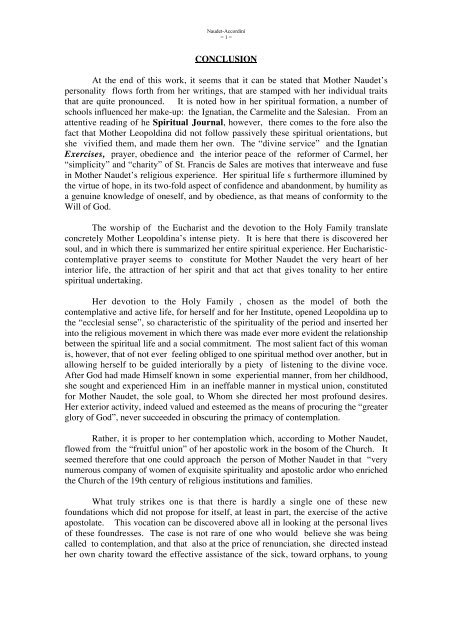
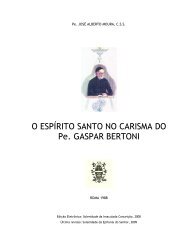
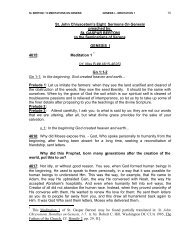
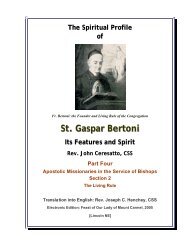
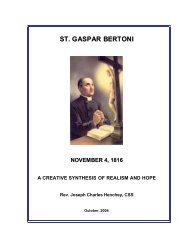
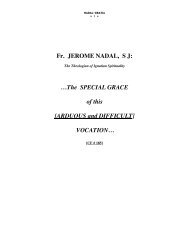
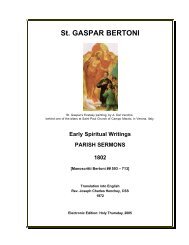
![[B.] St. IGNATIUS of LOYOLA Presentation: The ... - St. Gaspar Bertoni](https://img.yumpu.com/33393889/1/190x245/b-st-ignatius-of-loyola-presentation-the-st-gaspar-bertoni.jpg?quality=85)
